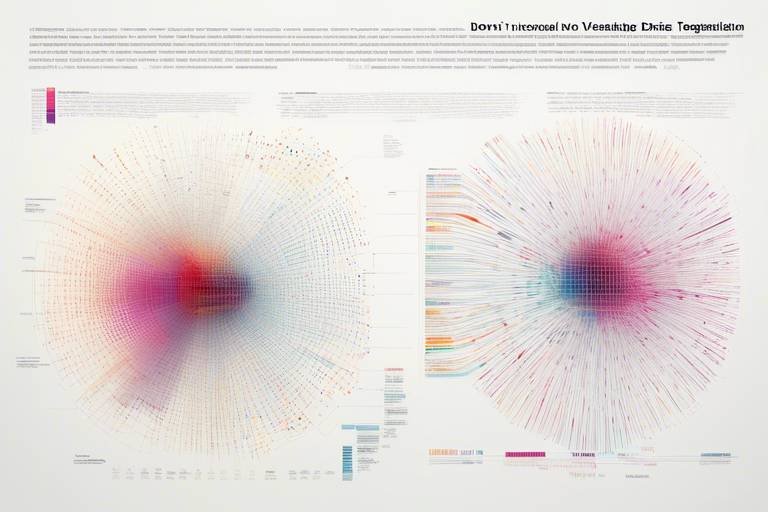The Role of AI in Enhancing Scientific Research
Artificial Intelligence (AI) is no longer just a futuristic concept; it has become an integral part of our daily lives, influencing various sectors, including healthcare, finance, and, most importantly, scientific research. Imagine a world where researchers can sift through mountains of data in a fraction of the time it would normally take, uncovering hidden patterns and insights that were previously buried under layers of complexity. This is the reality that AI is creating in the realm of scientific inquiry. By enhancing data analysis, accelerating discoveries, and promoting collaboration, AI is not just a tool but a transformative force driving groundbreaking advancements and innovations.
In today’s fast-paced research environment, the sheer volume of data generated can be overwhelming. Traditional methods of data analysis often fall short in terms of speed and accuracy. Enter AI—capable of processing vast datasets quickly and accurately. With its ability to identify patterns and correlations that human researchers might overlook, AI empowers scientists to make informed decisions based on robust data analysis. This capability is not merely an enhancement; it's a revolution in how research is conducted.
Moreover, the speed at which AI can operate means that researchers can focus on what truly matters: creativity and innovation. By automating repetitive tasks, AI frees up valuable time for scientists to engage in higher-level thinking and problem-solving. This acceleration in the research process leads to quicker breakthroughs and advancements across various scientific domains, from climate science to molecular biology. It’s as if AI has handed researchers a turbocharger, propelling them toward their goals at unprecedented speeds.
One of the most exciting aspects of AI in scientific research is its application in machine learning. Machine learning algorithms are becoming increasingly sophisticated, allowing researchers to engage in predictive modeling and hypothesis testing. These techniques not only enhance the efficiency of experimental designs but also improve the accuracy of outcomes. Imagine being able to predict the success of an experiment before even conducting it! This is the power of predictive modeling, which guides researchers in optimizing their resources and experimental directions.
Furthermore, AI-driven hypothesis testing is revolutionizing how researchers validate their ideas. Instead of testing one hypothesis at a time, AI enables the simultaneous evaluation of multiple hypotheses, significantly speeding up the inquiry process. This capability is akin to having a supercharged research assistant that can analyze data and provide insights at lightning speed, ultimately leading to faster scientific discoveries.
AI is also breaking down barriers in scientific research by fostering collaboration among researchers from diverse disciplines. With tools for data sharing and improved communication, AI encourages innovative approaches to complex scientific challenges. No longer are researchers confined to their silos; they can now collaborate seamlessly, sharing insights and expertise across various fields. This interdisciplinary approach not only enhances the quality of research but also leads to holistic solutions that address global challenges.
As we embrace the benefits of AI in scientific research, we must also navigate the ethical considerations that come with it. Issues such as data privacy, algorithmic bias, and the implications of AI-driven decision-making are critical to ensuring the integrity of research. Researchers must be vigilant in implementing robust protocols to protect sensitive data and mitigate biases in AI models. After all, the goal is not just to advance science but to do so responsibly and equitably.
- What is the primary role of AI in scientific research? AI enhances data analysis, accelerates discoveries, and fosters collaboration among researchers, leading to groundbreaking advancements.
- How does AI improve data analysis? AI processes vast datasets quickly and accurately, uncovering patterns and insights that traditional methods may miss.
- What are machine learning applications in scientific research? Machine learning algorithms are used for predictive modeling and hypothesis testing, improving the efficiency and accuracy of research outcomes.
- What ethical considerations should researchers keep in mind? Researchers must address data privacy concerns, algorithmic bias, and the implications of AI-driven decision-making to maintain research integrity.

AI in Data Analysis
Artificial intelligence significantly enhances data analysis capabilities, enabling researchers to process vast datasets quickly and accurately. Imagine trying to find a needle in a haystack; now, picture having a magnet that not only finds the needle but also reveals its properties and the surrounding context. This is what AI does for researchers: it uncovers patterns and insights that would be challenging to identify through traditional methods. By utilizing advanced algorithms and machine learning techniques, AI can sift through massive amounts of data, revealing correlations and trends that might otherwise go unnoticed.
One of the most compelling aspects of AI in data analysis is its ability to automate tedious tasks. Researchers no longer need to spend countless hours manually sorting through data; instead, they can focus on interpreting results and making informed decisions. For example, AI can quickly analyze gene sequences, identifying mutations that could lead to breakthroughs in medicine or agriculture. This not only saves time but also increases the accuracy of the findings, as AI algorithms can minimize human error.
Moreover, AI's predictive capabilities allow scientists to forecast outcomes based on existing data. This is akin to having a crystal ball that provides insights into potential future scenarios. By employing AI-driven predictive modeling, researchers can guide their experimental directions, optimizing resource allocation and increasing the likelihood of successful outcomes. For instance, in climate science, AI can help predict weather patterns and climate changes, enabling better preparation for natural disasters.
However, the integration of AI in data analysis is not without its challenges. As researchers rely more on AI tools, they must also ensure that they understand the underlying algorithms and their implications. Transparency in AI processes is crucial, as it allows researchers to validate results and maintain the integrity of their work. In this regard, collaboration among scientists, data analysts, and AI specialists becomes essential, forming a multidisciplinary approach to tackle complex scientific questions.
In summary, AI is revolutionizing the field of data analysis by enhancing accuracy, speeding up processes, and uncovering insights that were previously hidden. As we continue to explore the vast potential of AI, the future of scientific research looks brighter than ever, with the promise of groundbreaking discoveries on the horizon.
- How does AI improve data analysis in scientific research?
AI enhances data analysis by automating processes, identifying patterns, and providing predictive insights, allowing researchers to focus on interpretation rather than data sorting. - What are some examples of AI applications in data analysis?
Examples include analyzing gene sequences, predicting climate change impacts, and optimizing resource allocation in experiments. - What challenges does AI face in data analysis?
Challenges include ensuring algorithm transparency, addressing potential biases, and maintaining data privacy.

Accelerating Discoveries
Artificial intelligence (AI) is not just a buzzword; it’s a game-changer in the scientific research arena. Imagine a world where tedious tasks that once ate up hours of a scientist's time are now handled by intelligent algorithms. This is the reality that AI brings, allowing researchers to focus on what really matters: creative problem-solving and innovation. With AI at their disposal, scientists can dive straight into the heart of their research, unearthing breakthroughs faster than ever before.
One of the most significant ways AI accelerates discoveries is through the automation of repetitive tasks. Think about it: how much time do researchers spend on data entry, analysis, or even running experiments? By automating these processes, AI not only saves time but also reduces the likelihood of human error. This means that scientists can spend more time brainstorming new ideas or fine-tuning their experiments rather than getting bogged down in the minutiae of data handling.
For instance, in the field of pharmaceuticals, AI algorithms can analyze vast libraries of chemical compounds in a fraction of the time it would take a human researcher. By quickly identifying potential candidates for drug development, AI helps bring new treatments to market faster. The speed at which AI can analyze data is akin to having a supercharged assistant who never tires and can process information at lightning speed. This capability is revolutionizing fields as diverse as genomics, climate science, and materials engineering.
Machine learning, a subset of AI, plays a pivotal role in enhancing the research landscape. By utilizing advanced algorithms, researchers can engage in predictive modeling and hypothesis testing, which are crucial for efficient experimental designs. Imagine trying to predict the weather without any data; it would be nearly impossible! But with machine learning, scientists can create models that forecast outcomes based on existing data, guiding their experiments in a more targeted direction.
Predictive modeling is like having a crystal ball for researchers. By analyzing historical data, AI can predict future trends and outcomes, allowing scientists to allocate resources more effectively. For example, in environmental science, predictive models can help researchers understand potential climate changes based on current data. This not only aids in planning but also in implementing necessary measures to mitigate adverse effects. The ability to forecast outcomes is invaluable, as it helps in shaping the direction of research and prioritizing projects that could yield the most significant impact.
When it comes to hypothesis testing, AI truly shines. Traditional methods often require researchers to test one hypothesis at a time, which can be a lengthy process. However, AI-driven hypothesis testing allows scientists to evaluate multiple hypotheses simultaneously. This acceleration is akin to having a high-speed train that takes you to your destination in record time, rather than a slow bus that stops at every corner. By streamlining the validation process, researchers can explore various avenues of inquiry at once, significantly speeding up the pace of scientific discovery.
In summary, the integration of AI into scientific research is not just enhancing efficiency; it’s transforming the very fabric of how discoveries are made. By automating mundane tasks, enabling predictive modeling, and facilitating rapid hypothesis testing, AI is paving the way for a new era of innovation. The potential for groundbreaking advancements is limitless, and as researchers continue to harness the power of AI, we can expect to see a wave of discoveries that could change the world.
- How does AI improve data analysis in scientific research? AI enhances data analysis by processing large datasets quickly and accurately, uncovering patterns that would be difficult to find using traditional methods.
- What role does machine learning play in accelerating discoveries? Machine learning automates repetitive tasks and enables predictive modeling, allowing researchers to focus on innovation and creative problem-solving.
- What are the ethical considerations of using AI in research? Key ethical concerns include data privacy, algorithmic bias, and the implications of AI-driven decision-making on research integrity.

Machine Learning Applications
Machine learning (ML) is revolutionizing the landscape of scientific research, acting as a catalyst for innovation and efficiency. Imagine having a powerful assistant that can sift through mountains of data in seconds, pinpointing trends and anomalies that would take a human researcher days or even weeks to uncover. This is precisely what machine learning brings to the table. By leveraging algorithms that learn from data, researchers can not only enhance their understanding of complex phenomena but also make predictions that guide their experimental designs.
One of the most exciting aspects of machine learning in science is its ability to perform predictive modeling. This process involves using historical data to forecast future outcomes. For example, in the field of medicine, ML algorithms can analyze patient data to predict disease progression or treatment responses. Such predictive capabilities enable researchers to tailor their approaches, optimizing resources and improving patient outcomes. Here’s a quick look at how predictive modeling works:
| Step | Description |
|---|---|
| Data Collection | Gathering relevant data from various sources. |
| Data Preprocessing | Cleaning and preparing the data for analysis. |
| Model Training | Using algorithms to learn patterns from the data. |
| Validation | Testing the model on new data to assess accuracy. |
| Implementation | Applying the model to make predictions in real-world scenarios. |
Additionally, machine learning plays a crucial role in hypothesis testing. Traditionally, testing a hypothesis can be a labor-intensive process, often requiring extensive trial and error. However, with AI-driven techniques, researchers can evaluate multiple hypotheses simultaneously. This capacity not only accelerates the pace of scientific inquiry but also allows for a more comprehensive exploration of potential outcomes. By analyzing vast datasets, machine learning can identify which hypotheses are most likely to yield fruitful results, effectively streamlining the research process.
Moreover, the integration of machine learning into scientific research fosters an environment ripe for collaboration. Researchers from various disciplines can share their findings and tools, enhancing interdisciplinary studies. For instance, a biologist working on genetic data can collaborate with a computer scientist skilled in machine learning algorithms. Together, they can develop models that provide deeper insights into genetic markers associated with diseases. This kind of synergy is essential for tackling complex challenges that require diverse expertise.
In conclusion, the applications of machine learning in scientific research are not just beneficial; they are transformative. By enhancing predictive modeling, streamlining hypothesis testing, and fostering collaborative efforts, machine learning is paving the way for groundbreaking discoveries that can change the world. As we continue to explore the vast potential of AI and machine learning, the future of scientific research looks incredibly promising.
- What is machine learning? Machine learning is a subset of artificial intelligence that involves algorithms that learn from and make predictions based on data.
- How does machine learning enhance scientific research? It enables faster data analysis, predictive modeling, and hypothesis testing, leading to quicker discoveries and innovations.
- Can machine learning replace human researchers? No, machine learning is a tool that assists researchers, allowing them to focus on creative problem-solving rather than repetitive tasks.
- What are the ethical concerns with machine learning in research? Ethical concerns include data privacy, algorithmic bias, and the implications of AI-driven decision-making.

Predictive Modeling
Predictive modeling is a game-changer in the realm of scientific research, acting as a crystal ball that allows researchers to foresee potential outcomes based on existing data. Imagine being able to predict the weather with remarkable accuracy; that's what predictive modeling does for scientific inquiries. By leveraging historical data, researchers can create sophisticated models that help them understand trends and make informed decisions about future experiments. This isn't just about crunching numbers; it's about transforming raw data into actionable insights that can steer the direction of research projects.
At its core, predictive modeling uses algorithms that analyze patterns within datasets. These algorithms can identify correlations that might go unnoticed through traditional analysis. For instance, in drug discovery, predictive models can help scientists determine which compounds are most likely to succeed in clinical trials, thus optimizing the allocation of resources and time. This not only accelerates the pace of research but also enhances the probability of successful outcomes, leading to groundbreaking advancements in medicine and beyond.
Furthermore, predictive modeling can be categorized into various types, such as regression models, decision trees, and neural networks. Each of these models has its strengths and applications, tailored to the specific needs of different scientific fields. For example:
| Model Type | Description | Application |
|---|---|---|
| Regression Models | Used to predict a continuous outcome based on one or more predictor variables. | Economics, Environmental Science |
| Decision Trees | A flowchart-like structure that makes decisions based on data attributes. | Biology, Social Sciences |
| Neural Networks | Computational models inspired by the human brain, ideal for complex patterns. | Genomics, Image Analysis |
By utilizing these models, researchers can simulate various scenarios, allowing them to explore what-if questions that drive innovation. For instance, in climate science, predictive modeling can help scientists anticipate the impacts of climate change under different policy scenarios, guiding decision-makers in crafting effective strategies. This ability to visualize potential futures empowers researchers to make proactive choices rather than reactive ones, ultimately leading to more efficient and impactful scientific endeavors.
In summary, predictive modeling is not just a statistical tool; it's a powerful ally in the quest for knowledge. By harnessing the capabilities of AI, researchers can elevate their understanding of complex systems and phenomena, paving the way for discoveries that were once thought to be out of reach. As we continue to refine these models and integrate them into our research methodologies, the possibilities for scientific advancement become virtually limitless.
- What is predictive modeling? Predictive modeling is a statistical technique that uses historical data to predict future outcomes.
- How does predictive modeling benefit scientific research? It helps researchers make informed decisions, optimize resources, and accelerate discoveries.
- What types of predictive models are commonly used? Common types include regression models, decision trees, and neural networks.
- Can predictive modeling be applied in various scientific fields? Yes, it is widely used in fields such as medicine, climate science, and social sciences.
- Is predictive modeling only for large datasets? While it is most effective with large datasets, it can also be applied to smaller datasets with careful consideration.

Hypothesis Testing
Hypothesis testing is a cornerstone of scientific inquiry, acting as a rigorous method for evaluating ideas and theories. With the integration of artificial intelligence, this process has been revolutionized. Traditionally, researchers would formulate a hypothesis based on observed phenomena and then gather data to either support or refute it. This can be a labor-intensive process, often fraught with delays and uncertainties. However, AI streamlines this process by allowing researchers to evaluate multiple hypotheses simultaneously, significantly accelerating the pace of discovery.
Imagine you’re a scientist trying to determine the effectiveness of a new drug. In a traditional setup, you might test one hypothesis at a time, painstakingly gathering data and analyzing it before moving on to the next. This could take months or even years. Now, picture employing an AI system that can sift through vast amounts of clinical trial data, testing numerous hypotheses at once. This not only saves time but also enhances the accuracy of the results, as AI can identify subtle patterns that might go unnoticed by human researchers.
One of the remarkable features of AI in hypothesis testing is its ability to utilize machine learning algorithms. These algorithms can learn from previous data and outcomes, refining their predictive capabilities over time. As a result, they can suggest new hypotheses based on existing data, leading researchers down innovative paths they may not have considered. For instance, in fields like genomics or drug discovery, AI can analyze genetic data to propose hypotheses about gene interactions or drug efficacy, which can then be tested in experimental settings.
Moreover, AI-powered hypothesis testing can enhance collaboration among researchers. With the ability to share data and insights across platforms, scientists from different disciplines can contribute to and benefit from collective knowledge. This collaborative environment fosters a culture of innovation, where diverse perspectives can lead to groundbreaking discoveries. For example, a biologist and a data scientist working together can leverage AI tools to validate their hypotheses more effectively than they could individually.
However, while the advantages of AI in hypothesis testing are substantial, it is essential to approach this technology with caution. Researchers must remain vigilant about the integrity of their data and the algorithms they employ. Bias in AI models can lead to skewed results, potentially undermining the very foundation of scientific inquiry. Thus, a careful balance must be maintained between leveraging AI's capabilities and ensuring rigorous scientific standards.
In summary, AI is transforming hypothesis testing by making it faster, more efficient, and collaborative. By enabling the simultaneous evaluation of multiple hypotheses and enhancing predictive modeling, AI is paving the way for a new era of scientific discovery. As researchers continue to harness the power of AI, the potential for groundbreaking advancements in various fields becomes increasingly promising.
- What is hypothesis testing?
Hypothesis testing is a statistical method used to determine the validity of a hypothesis based on sample data. - How does AI improve hypothesis testing?
AI enhances hypothesis testing by allowing researchers to evaluate multiple hypotheses simultaneously, improving efficiency and accuracy. - What are the risks of using AI in hypothesis testing?
Risks include potential bias in algorithms and data privacy concerns, which can affect the integrity of research outcomes. - Can AI suggest new hypotheses?
Yes, AI can analyze existing data and suggest new hypotheses for researchers to explore.

Collaboration and Interdisciplinary Research
This article explores how artificial intelligence is transforming scientific research, improving data analysis, accelerating discoveries, and fostering collaboration across various fields, ultimately leading to groundbreaking advancements and innovations.
Artificial intelligence significantly enhances data analysis capabilities, enabling researchers to process vast datasets quickly and accurately, uncovering patterns and insights that would be challenging to identify through traditional methods.
AI technologies expedite the research process by automating repetitive tasks, allowing scientists to focus on creative problem-solving and innovation, leading to faster breakthroughs and advancements in various scientific domains.
Machine learning algorithms are increasingly applied in scientific research, enabling predictive modeling and hypothesis testing, which enhance the efficiency and accuracy of experimental designs and outcomes.
Predictive modeling using AI helps researchers forecast potential outcomes based on existing data, guiding experimental directions and optimizing resource allocation in scientific studies.
AI-driven hypothesis testing streamlines the validation process, allowing researchers to evaluate multiple hypotheses simultaneously, thus accelerating the pace of scientific inquiry and discovery.
In today's rapidly evolving scientific landscape, collaboration and interdisciplinary research have become more crucial than ever. Artificial Intelligence (AI) plays a pivotal role in breaking down barriers between different fields of study, enabling researchers from diverse backgrounds to work together seamlessly. Imagine a team of biologists, chemists, and data scientists coming together to tackle complex health issues; AI serves as the common language that facilitates this synergy.
AI tools provide platforms for effective data sharing and communication, allowing researchers to access and analyze shared datasets without the traditional hurdles of differing methodologies or terminologies. This collaborative environment not only fosters innovation but also leads to more comprehensive solutions to scientific challenges. For instance, consider the fight against climate change: environmental scientists can work alongside computer scientists to model climate patterns using AI, resulting in more accurate predictions and effective strategies.
Moreover, the integration of AI in collaborative research encourages the development of interdisciplinary teams that leverage the strengths of each discipline. By combining expertise, researchers can approach problems from multiple angles, enhancing creativity and innovation. Here are some key benefits of this collaborative approach:
- Enhanced Creativity: Diverse perspectives lead to innovative solutions that might not emerge within a single discipline.
- Resource Optimization: Sharing resources and knowledge reduces redundancy and maximizes efficiency.
- Accelerated Research: Collaborative efforts can significantly shorten research timelines by pooling expertise and resources.
As AI continues to evolve, its ability to facilitate collaboration will only grow stronger. Researchers can expect to see more sophisticated AI-driven platforms that not only enhance communication but also provide real-time analytics, enabling teams to make data-informed decisions quickly. The future of scientific research is undoubtedly collaborative, and AI is the catalyst driving this change.
The integration of AI in scientific research raises important ethical considerations, including data privacy, bias in algorithms, and the implications of AI-driven decision-making on research integrity and accountability.
As AI systems process sensitive data, ensuring data privacy is crucial. Researchers must implement robust protocols to protect individual information while leveraging AI for enhanced insights.
Algorithmic bias can lead to skewed results in scientific research. It is essential for researchers to identify and mitigate biases in AI models to ensure equitable and accurate outcomes.
- What is the role of AI in scientific research? AI enhances data analysis, accelerates discoveries, and fosters interdisciplinary collaboration.
- How does AI improve data analysis? AI can process vast datasets quickly, uncovering patterns and insights that traditional methods might miss.
- What are the ethical concerns surrounding AI in research? Key concerns include data privacy, algorithmic bias, and the integrity of AI-driven decision-making.

Ethical Considerations in AI Research
The integration of artificial intelligence in scientific research is not just a technological advancement; it also brings with it a myriad of ethical considerations that cannot be ignored. As we dive deeper into the digital age, where AI systems process massive amounts of data, the implications of these technologies on ethics, integrity, and accountability become ever more pressing. Researchers and institutions must navigate this complex landscape with care, ensuring that the benefits of AI are harnessed responsibly.
One of the primary concerns surrounding AI in research is data privacy. As AI systems often rely on sensitive information, it is crucial for researchers to implement robust protocols to protect individual data. This involves not only adhering to legal regulations such as GDPR but also fostering a culture of transparency and trust. For instance, researchers must be clear about how data is collected, processed, and utilized, ensuring that participants are informed and their consent is obtained. The balance between leveraging data for groundbreaking discoveries and safeguarding individual privacy is delicate, yet essential.
Moreover, the issue of algorithmic bias is another critical ethical consideration. AI models are only as good as the data they are trained on, and if that data contains biases, the results will reflect those biases. This can lead to skewed outcomes in scientific research, potentially perpetuating inequalities or misinforming public health policies. To combat this, researchers need to actively identify and mitigate biases in their AI models. This could involve diversifying training datasets or employing techniques that specifically target bias reduction. By doing so, scientists can ensure that their findings are equitable and accurate, paving the way for more reliable scientific advancements.
In addition to data privacy and algorithmic bias, the implications of AI-driven decision-making on research integrity are significant. As AI systems begin to assist in making critical decisions, researchers must remain vigilant about the accountability of these systems. Questions arise about who is responsible when an AI system makes a mistake: the researcher, the institution, or the AI itself? Establishing clear guidelines and accountability measures is essential to maintain the integrity of the research process. This includes regular audits of AI systems and ensuring that human oversight remains a pivotal part of the decision-making process.
Ultimately, the ethical considerations in AI research are multifaceted and require a collaborative approach among researchers, ethicists, and policymakers. By fostering open discussions about these issues, the scientific community can better navigate the challenges posed by AI technologies. Embracing these ethical considerations not only enhances the credibility of scientific research but also builds public trust in the innovations that AI can bring.
- What are the main ethical concerns related to AI in research?
The primary ethical concerns include data privacy, algorithmic bias, and the implications of AI-driven decision-making on research integrity.
- How can researchers ensure data privacy when using AI?
Researchers can ensure data privacy by implementing robust data protection protocols, obtaining informed consent, and adhering to legal regulations such as GDPR.
- What steps can be taken to address algorithmic bias?
To address algorithmic bias, researchers should diversify their training datasets and employ techniques designed to reduce bias in AI models.
- Who is responsible for decisions made by AI systems in research?
Responsibility for AI-driven decisions typically lies with the researchers and institutions, emphasizing the need for clear accountability measures.

Data Privacy Concerns
As we delve deeper into the realm of artificial intelligence (AI) in scientific research, one cannot overlook the pressing issue of data privacy. With AI systems processing enormous amounts of sensitive data, the potential for breaches and misuse becomes a significant concern. Imagine a world where your personal health data, genetic information, or even your research findings could be exposed to unauthorized parties. This is not just a hypothetical scenario; it’s a reality that researchers must navigate carefully.
To ensure that data privacy is upheld, researchers are urged to implement robust protocols that safeguard individual information. These protocols may include encryption, access controls, and regular audits of data handling practices. It’s crucial to create a culture of accountability where data protection is as important as the research itself. After all, trust is the foundation of any scientific endeavor, and breaches can lead to a significant loss of confidence among participants and the public.
Moreover, the integration of AI in research often involves collaboration across various institutions and disciplines. This collaborative nature can complicate privacy issues, as data may be shared between multiple parties. To mitigate these risks, researchers should consider the following strategies:
- Informed Consent: Always obtain explicit consent from individuals whose data is being used.
- Anonymization: Where possible, anonymize data to prevent identification of individuals.
- Compliance with Regulations: Adhere to data protection regulations such as GDPR or HIPAA to ensure legal compliance.
In addition to these strategies, it's important to foster a transparent environment where participants are informed about how their data will be used. This not only enhances trust but also empowers individuals to make informed decisions about their participation in research studies.
As we continue to embrace AI in scientific research, the conversation around data privacy must evolve. Researchers need to stay updated on the latest privacy technologies and best practices to ensure that they are adequately protecting sensitive information. The balance between leveraging AI for groundbreaking discoveries and maintaining ethical standards in data handling is delicate but essential.
- What is data privacy in the context of AI research? Data privacy refers to the proper handling and protection of personal and sensitive information collected during research, ensuring that it is not misused or exposed without consent.
- Why is data privacy a concern in AI? AI systems often analyze large datasets that may contain personal information, making them susceptible to breaches, misuse, and ethical dilemmas regarding consent and confidentiality.
- How can researchers protect data privacy? Researchers can protect data privacy by implementing encryption, obtaining informed consent, anonymizing data, and complying with relevant data protection regulations.

Addressing Algorithmic Bias
In the ever-evolving landscape of artificial intelligence, algorithmic bias stands out as a critical concern that researchers must address. This bias can manifest in various ways, leading to skewed results that not only compromise the integrity of scientific research but also perpetuate inequalities in society. Imagine a world where the very tools designed to enhance our understanding of complex phenomena inadvertently reinforce existing prejudices. It's a sobering thought, isn't it?
To tackle algorithmic bias effectively, researchers need to adopt a multi-faceted approach. First and foremost, it is essential to identify the sources of bias. Bias can creep in at different stages of the AI development process, from data collection to model training. For instance, if the dataset used to train an AI model lacks diversity, the outcomes produced by that model may not accurately reflect the real-world population. This is particularly concerning in fields such as healthcare, where biased algorithms can lead to unequal treatment options for different demographic groups.
Once biases are identified, the next step is to implement strategies to mitigate their impact. This can involve several approaches:
- Conducting regular audits of AI models to assess their performance across different demographic groups.
- Incorporating diverse datasets that represent a wide range of perspectives and experiences.
- Utilizing techniques such as fairness-aware machine learning to ensure that models are trained to minimize bias.
Moreover, fostering a culture of transparency and accountability within research teams is vital. Researchers should be encouraged to share their findings and methodologies openly, allowing for peer review and scrutiny. This collaborative spirit not only enhances the credibility of the research but also helps in identifying and rectifying biases that may have gone unnoticed.
In conclusion, addressing algorithmic bias is not just a technical challenge; it's a moral imperative. As we harness the power of AI to push the boundaries of scientific inquiry, we must also commit to ensuring that our tools are equitable and just. The responsibility lies with each researcher and institution to cultivate an environment where biases are actively identified and mitigated, paving the way for a future where AI serves all of humanity fairly.
- What is algorithmic bias?
Algorithmic bias refers to systematic and unfair discrimination that can occur when AI algorithms produce results that are prejudiced due to the data they were trained on. - How can researchers identify algorithmic bias?
Researchers can identify bias by conducting audits of their AI models, analyzing the outcomes across different demographic groups, and ensuring their datasets are diverse. - What are the consequences of algorithmic bias in scientific research?
Consequences can include skewed research results, perpetuation of societal inequalities, and loss of trust in scientific findings. - What steps can be taken to mitigate algorithmic bias?
Steps include using diverse datasets, employing fairness-aware machine learning techniques, and fostering transparency and accountability in research practices.
Frequently Asked Questions
- What is the role of AI in scientific research?
AI plays a transformative role in scientific research by enhancing data analysis, accelerating discoveries, and fostering collaboration across various fields. It helps researchers process vast amounts of data quickly, uncovering patterns and insights that might be missed through traditional methods.
- How does AI improve data analysis?
AI improves data analysis by utilizing advanced algorithms to sift through large datasets efficiently. This capability allows researchers to identify trends, correlations, and anomalies that can lead to significant scientific breakthroughs, ultimately saving time and resources.
- Can AI really accelerate discoveries in science?
Absolutely! By automating repetitive tasks, AI frees up scientists to focus on creative problem-solving and innovation. This means that researchers can make faster progress in their studies, leading to quicker breakthroughs and advancements in various scientific domains.
- What are machine learning applications in research?
Machine learning applications in research involve using algorithms to perform predictive modeling and hypothesis testing. These applications enhance the efficiency and accuracy of experimental designs, allowing researchers to forecast potential outcomes and evaluate multiple hypotheses simultaneously.
- What ethical considerations arise from using AI in research?
The integration of AI in scientific research raises several ethical considerations, including data privacy, algorithmic bias, and the implications of AI-driven decision-making. Researchers need to ensure robust protocols to protect sensitive data and mitigate biases in AI models to maintain research integrity.
- How can researchers address data privacy concerns when using AI?
Researchers can address data privacy concerns by implementing strong data protection protocols, ensuring that personal information is anonymized, and adhering to legal regulations regarding data usage. This approach allows them to leverage AI for insights while safeguarding individual privacy.
- What is algorithmic bias, and why is it important in AI research?
Algorithmic bias refers to systematic errors in AI models that can lead to skewed results. It's crucial for researchers to identify and mitigate these biases to ensure equitable and accurate outcomes in scientific research, as biased algorithms can undermine the validity of findings.



















